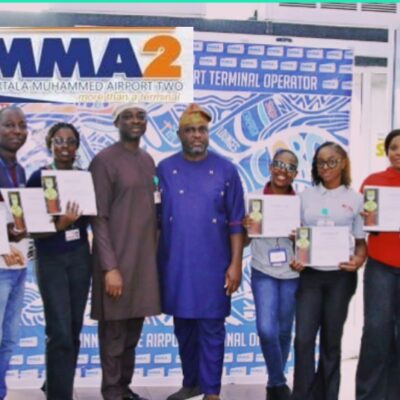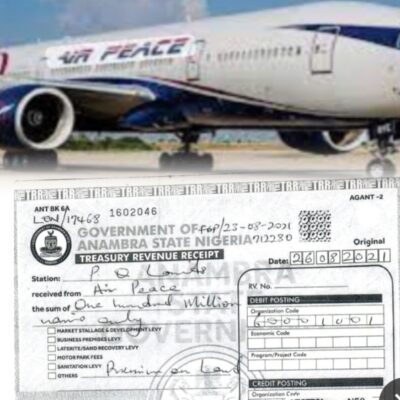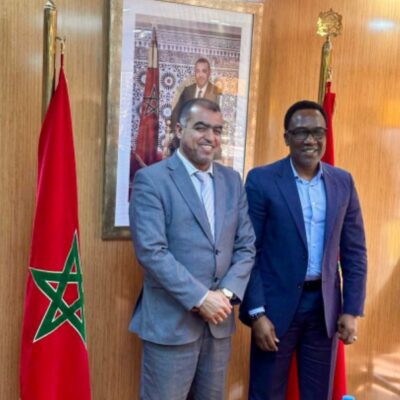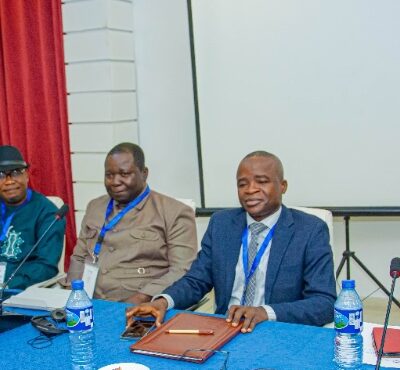
BY OLAPEJU OLUBI
Chairman of Air Peace, Dr. Allen Onyema, has issued a blunt warning that Nigerian airlines will continue to struggle, and some may collapse, unless the federal government urgently tackles crippling taxes, exorbitant borrowing costs, poor infrastructure and the global stigma inflating their operating expenses.
Speaking at the just-concluded 29th League of Airports and Aviation Correspondents (LAAC) Conference in Lagos, themed “Aviation Financing in Nigeria: Risks, Opportunities and Prospects”, Onyema said the current financing environment is “a death sentence” for local carriers.
“If you invest $100 million in aviation, maybe you end up expecting three to five percent profit. In agriculture or importation, that same investment could return up to 70 percent.
“Yes, you make profit, but the margin is nothing to celebrate. The high cost of doing business in Nigeria erodes those profits before you can breathe” he told industry stakeholders. “
He pointed to excessive taxation as one of the most punishing burdens, citing the legislated 5 percent charge on ticket fares payable to the Nigeria Civil Aviation Authority (NCAA).
“The NCAA says that 5 percent doesn’t belong to us, that we’re collecting it for the government. But in reality, it eats directly into our revenue. ICAO principles talk about cost recovery, not punitive charges. On top of that, the proposed customs duties and VAT on imported aircraft, spare parts and ticket fares would kill airlines within 48 hours if implemented,” he warned.
Onyema credited Aviation Minister, Festus Keyamo, for stepping in to halt the proposed tax regime scheduled for January 2026. “It’s never been done anywhere before. I am glad the Minister is taking it up because that kind of policy would be a death sentence for this industry,” he said.
Responding to economist Bismarck Rewane’s call for airline consolidation similar to the banking sector, Onyema said the comparison was hollow without access to affordable capital.
“When banks consolidated, they raised their capital. The only way airlines can do that is with access to funding. Right now, borrowing at 35 percent interest is dead on arrival. Aviation is capital-intensive with low returns worldwide. You can’t treat it like every other sector. We deserve single-digit interest rates for funding, like it’s done globally. If we get that, no airline will fail in this country”, he explained.
While supporting the idea of the government acting as a sovereign guarantor for airline loans locally and abroad, Onyema cautioned that airlines must also act responsibly.
“Airlines must first carry out self-introspection. What kind of airline do you want to run – premium or budget? What’s your market share? If you borrow more than you need, that’s a problem. Government guarantees must be matched with responsible management”, he said.
He hailed the federal government’s plan to establish a national aircraft leasing company, which would buy planes and lease them to Nigerian carriers at affordable rates.
“That’s a game-changer. I can’t thank President Bola Tinubu enough for allowing Keyamo to take these steps. Financing is not just about borrowing, ease of doing business and reducing excessive taxes and charges will also help airlines thrive.
“The minister is already reviewing these charges with the Airline Operators of Nigeria (AON). The most important thing is that the government is listening, and I believe within a year we’ll see drastic changes”, he noted.
Onyema lamented that Nigerian carriers are often unfairly compared to smaller foreign competitors, citing Ghana’s Africa World Airlines (AWA) as an example.
“AWA has about six aircraft, all Embraer 145s. The smallest airline in Nigeria is bigger than AWA. Yet we glorify them and refuse to appreciate our own. Air Peace has partnerships with Emirates and Air Arabia and flies to London, Dubai, Mumbai, and nine African countries.
“But when passengers come to the airport believing local airlines are bad, one small issue is enough for them to escalate it. Everyone is now a content creator, ready to amplify any problem.”
He also identified the lack of proper transit facilities at Nigerian airports as a major obstacle to turning the country into a regional aviation hub.
“We had passengers transiting from Douala to Dakar through Lagos who had to pay $400 in visa fees and go through immigration, health, quarantine, and customs because we lack true airside transfer facilities. Tell me if that passenger will fly your airline again. This is why hubs thrive in places like Togo. Without proper airport infrastructure, even if you have 200 aircraft, you can’t build a hub,” he noted.
Onyema expressed optimism that upgrades to Lagos airport recently approved by the government could finally enable hub operations, saying, “In the next 22 months, this country will have an airport we can be proud of.”
Another major drain on airline resources, he said, is inflated insurance costs caused by Nigeria’s international image problem.
His words; “What is used to insure eight aircraft abroad is what we use to insure just one here because they claim Nigeria is unsafe. It’s a lie – this is a beautiful country. Every nation has its share of problems.
“The Vice President of IATA was shocked when he saw our insurance bills. Until we change this stigma, financing alone won’t save us.”
Concluding, Onyema said Nigerian airlines have “paid their dues” and can surpass African competitors if given the right backing. “If we get the right infrastructure and policy support, Ethiopia and others will be a thing of the past within 10 years. When we succeed, the whole sector succeeds.”





